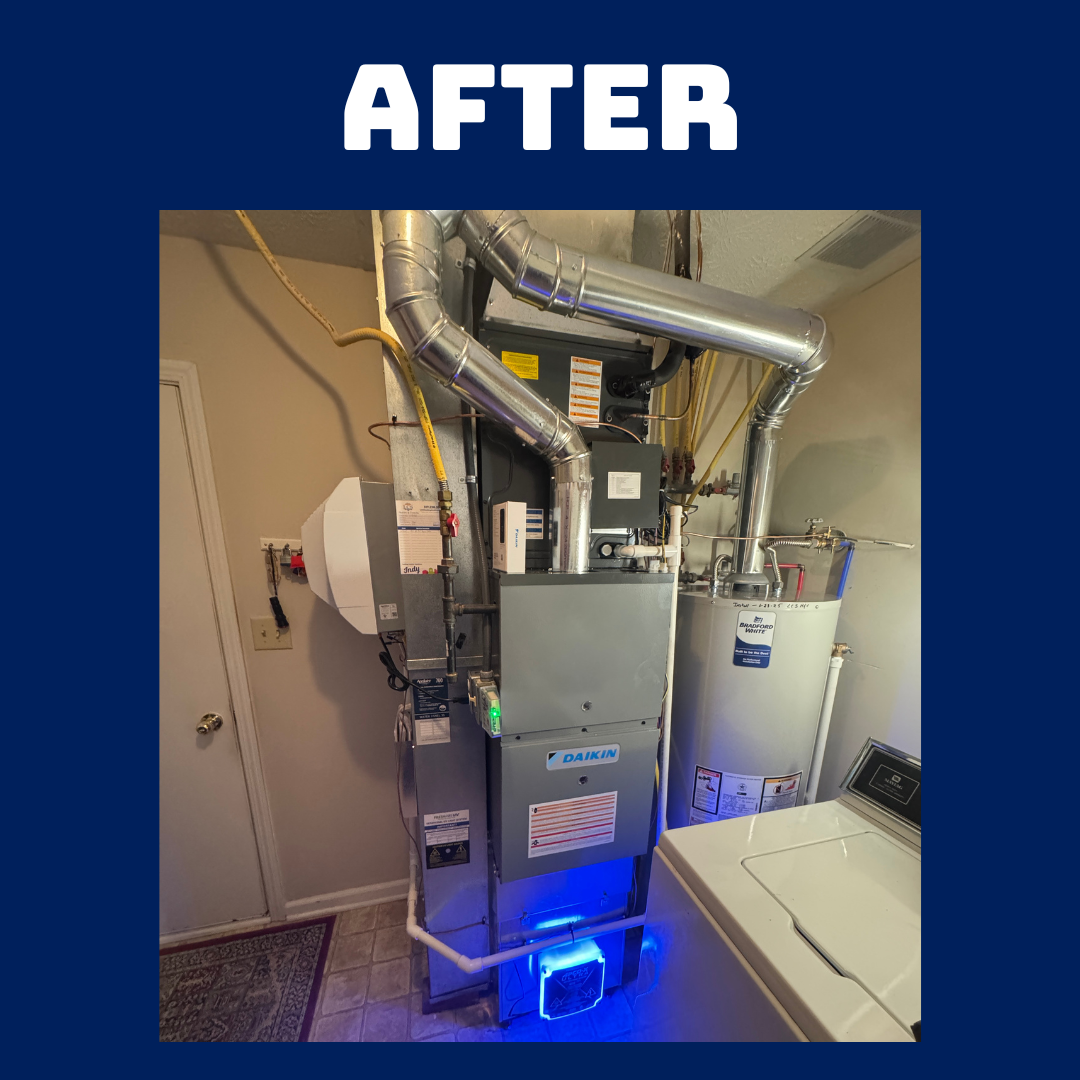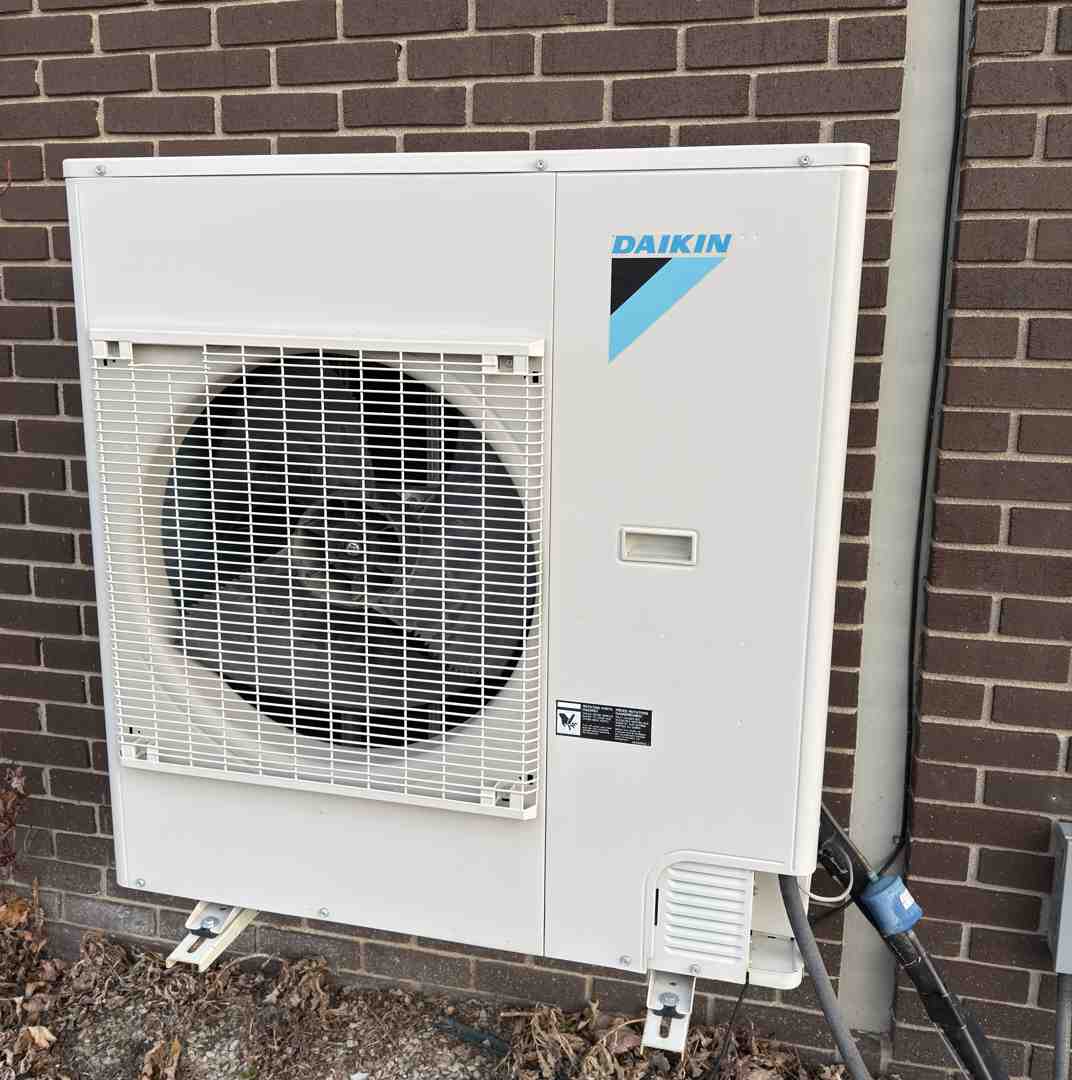Expert Heat Pump Repair: Solutions for Every Problem
Why Your Heat Pump Deserves Expert Attention
Heat pump repair is essential when your system stops providing reliable comfort for your Indianapolis home. Whether you're facing inconsistent temperatures, strange noises, or climbing energy bills, recognizing the signs of trouble and knowing when to call a professional can save you from major breakdowns and uncomfortable living conditions.
Quick answers for common heat pump repair needs:
- Inconsistent heating or cooling - Check your thermostat and filters before calling a technician.
- Strange noises (grinding, squealing) - These indicate mechanical issues requiring immediate professional attention.
- Ice buildup on coils - Persistent ice means you need repair service.
- Frequent on/off cycling - Often caused by dirty filters or thermostat problems.
- Rising energy bills - A sign your system is working harder than it should.
- Professional service recommended when - You encounter refrigerant leaks, electrical problems, or recurring issues that DIY checks don't resolve.
For comprehensive HVAC guidance, visit our Heat Pump Services page, and when you're ready for service, schedule your heat pump repair in Indianapolis.
Your heat pump works year-round, making it efficient but also subject to constant wear. Most systems last 10 to 15 years with proper care, but problems can emerge at any time. The difference between a well-maintained and a neglected heat pump can mean 10 to 25 percent more energy consumption.
Understanding what requires a quick DIY check versus what demands professional expertise protects your investment. Simple tasks like changing a filter are fine for homeowners. However, issues involving refrigerant, electrical components, or mechanical failures require trained technicians with specialized tools and knowledge.
Signs Your System Needs Heat Pump Repair
Your heat pump usually gives you warning signs before it fails completely. Learning to recognize these early signals can save you from emergency repair calls and keep your home comfortable year-round. Here's what to watch for when your heat pump starts showing signs of trouble.
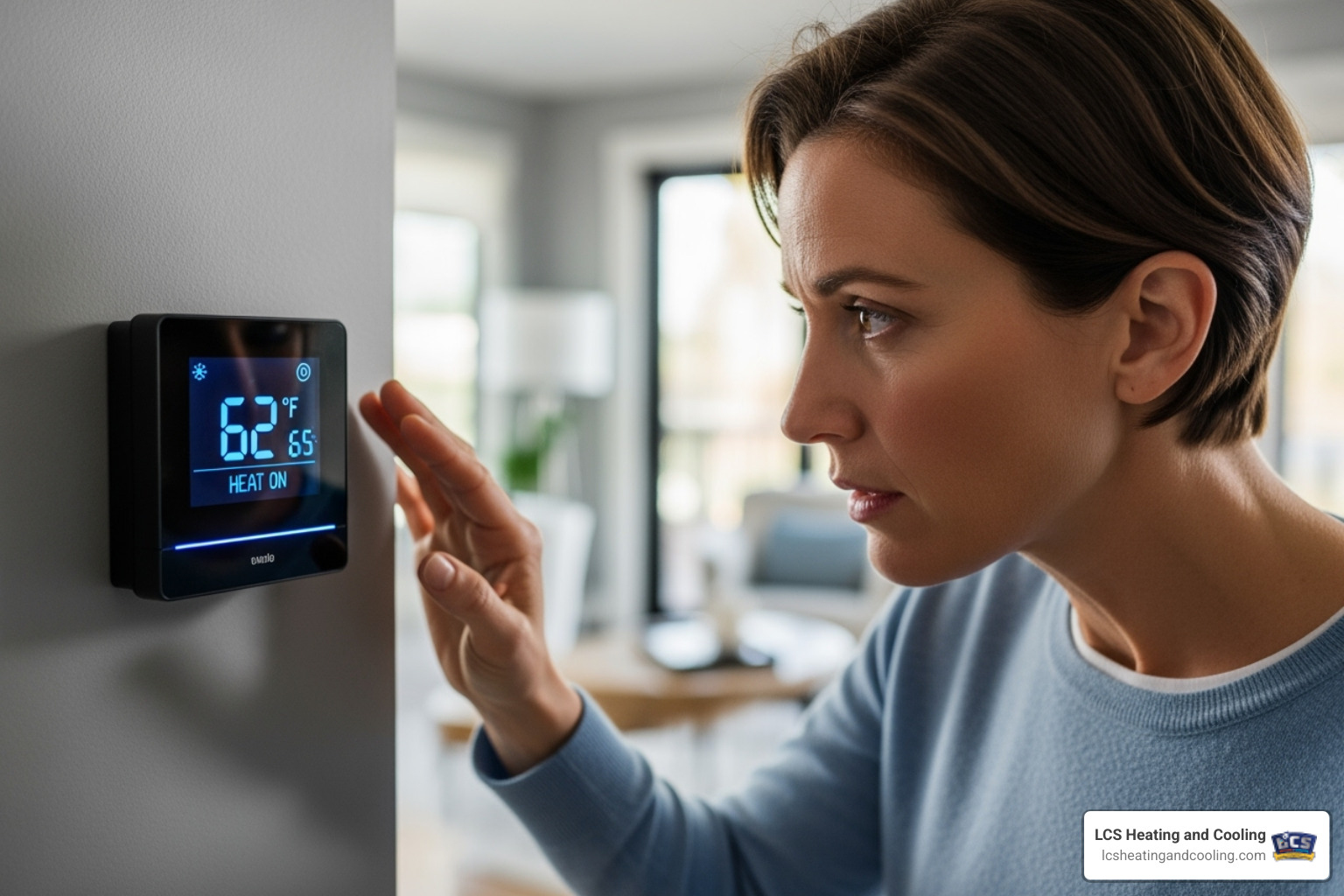
Inconsistent temperatures are often the first sign something's wrong. If your system can't seem to reach the set temperature or you notice uneven comfort between rooms, it's time to pay attention. This can point to low refrigerant levels, a faulty reversing valve, or airflow problems.
Unusual noises deserve immediate attention. While your heat pump makes some operational sounds, grinding, squealing, rattling, or banging are not normal. These noises are your system's way of calling for help, often signaling motor problems or loose components that will only get worse with time.
Increased energy bills can be a surprise. If you notice a sudden spike in electricity usage without a change in your habits, your heat pump is likely working harder than it should. This inefficiency wastes money and often signals underlying problems like dirty coils or refrigerant leaks. Our blog post on Electricity Bill Spike Heat Pumps And Extreme Weather Could Be To Blame explores this issue.
Frequent cycling is when your system turns on and off constantly, never completing a full heating or cooling cycle. This "short cycling" puts tremendous stress on your compressor and shortens your system's lifespan. It can stem from an improperly sized unit, a faulty thermostat, or restricted airflow.
Visible ice or frost on your heat pump requires careful attention. While some ice during a defrost cycle is normal in cold weather, persistent ice buildup is not. Low refrigerant, a malfunctioning defrost control, or poor airflow can all cause excessive ice. Ignoring this can lead to serious damage. Learn more in our post about 4 Troublesome Heat Pump Problems And Their Solutions.
Poor airflow from your vents means your system isn't distributing conditioned air effectively. Weak airflow can be caused by dirty air filters, blocked ductwork, or a failing blower motor. Proper airflow is essential for both comfort and efficiency.
When you notice any of these warning signs, it's time to consider heat pump repair. Catching problems early almost always costs less and prevents the inconvenience of a complete system failure.
Common Problems and Professional Solutions
When your heat pump acts up, understanding the issue can help you appreciate why professional heat pump repair is so important. Many problems require specialized knowledge and tools that go beyond a homeowner's toolkit. Here are some of the most common issues our technicians solve.
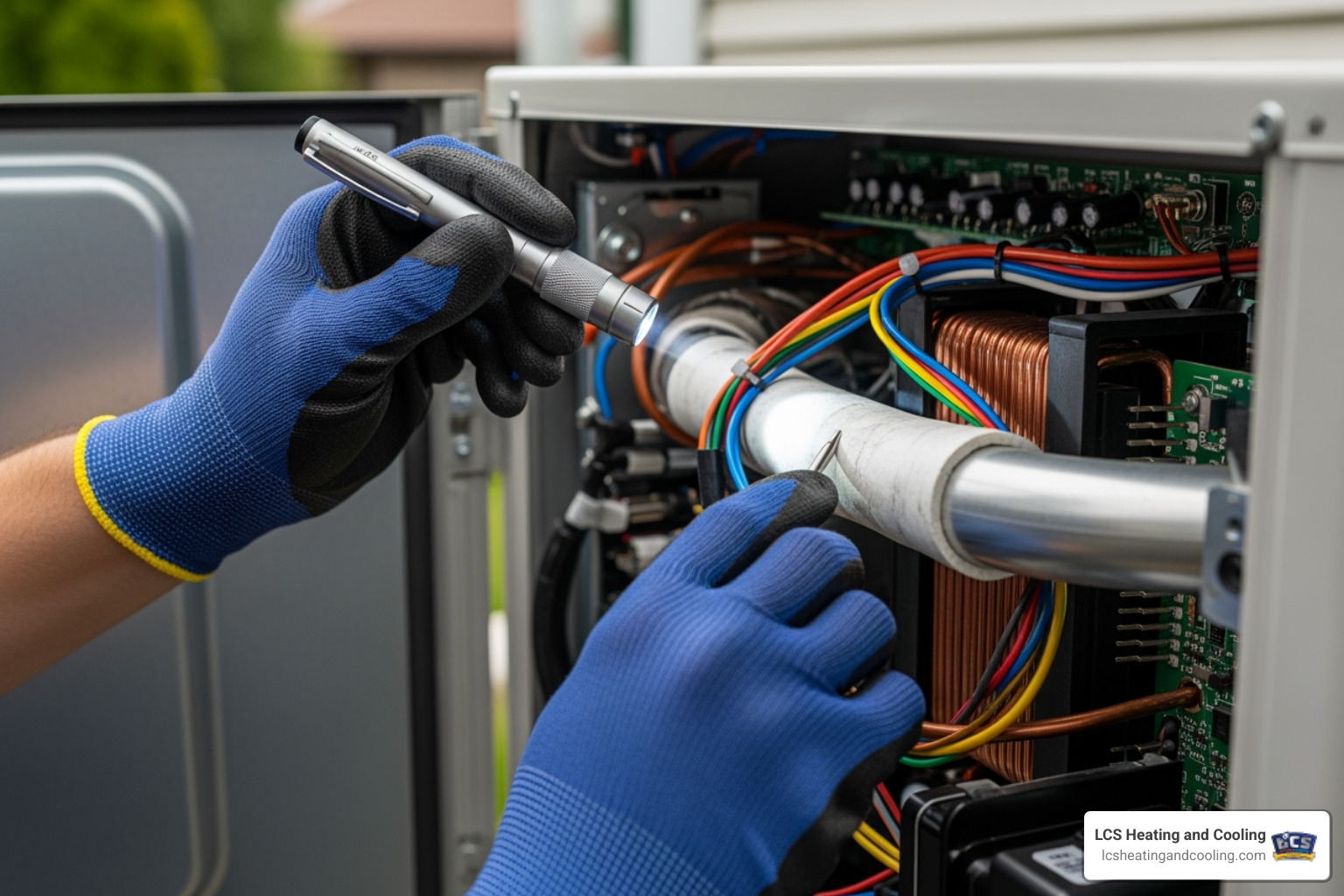
Refrigerant Leaks
Refrigerant is the substance that allows your heat pump to move heat. When it leaks, your system can't perform its job efficiently. You may notice reduced performance, hear hissing sounds, or see frozen coils. Simply adding more refrigerant isn't a solution; the leak must be found and fixed. Our technicians use professional leak detection equipment to locate and repair the source of the leak, then recharge the system to manufacturer specifications. Handling refrigerants is regulated for safety and environmental reasons and should only be done by a trained professional.
Electrical Component Failure
Your heat pump relies on a network of electrical components. When one fails, it can shut the whole system down. Faulty capacitors can prevent motors from starting, while worn contactors can interrupt power to key components. A malfunctioning control board, the system's brain, can cause all sorts of erratic behavior. Diagnosing and repairing these electrical issues can be dangerous without proper training. Our technicians can safely identify the problem and replace faulty components to restore your system's reliability.
Thermostat and Sensor Issues
Your thermostat is the command center, but if it malfunctions, it can cause chaos. Incorrect temperature readings or communication errors can prevent the system from responding to your commands. The issue could be faulty wiring or a failed thermostat. Additionally, malfunctioning sensors within the heat pump can send incorrect signals to the control board, causing inefficient operation or shutdowns. We can diagnose whether the issue lies with your thermostat or an internal sensor and provide the right solution.
Airflow and Blower Motor Problems
Proper airflow is essential for your heat pump's performance. Clogged air filters are the most common cause of airflow problems, forcing the system to work harder and waste energy. Obstructed ductwork from leaks or blockages can also restrict airflow and cause uneven temperatures. A failing blower motor, which moves air through your ducts, is a more serious issue that leads to weak airflow and can cause the system to overheat. We inspect the entire airflow system to identify and resolve any restrictions.
DIY Checks vs. Professional Service
It can be tempting to try and fix a heat pump problem yourself, and sometimes a simple check is all that's needed. However, it's critical to know when to DIY and when to call in the pros for safety and to ensure the problem is fixed correctly.
Simple Troubleshooting for Your Heat Pump
Before calling for service, a few safe and simple checks might solve the issue:
- Check thermostat settings. Ensure it's set to the correct mode (heat or cool) and a reasonable temperature. For efficiency, the fan should be set to "auto."
- Inspect and change dirty air filters. A clogged filter is a top cause of problems. It restricts airflow and makes your system work harder. Change filters every 1-3 months. For better air quality, consider filters with higher MERV ratings.
- Clear debris from the outdoor unit. Your outdoor unit needs at least two feet of clearance. Remove any leaves, grass, or dirt buildup that could block airflow.
- Reset the circuit breaker. If your system has no power, find its breaker in your electrical panel and reset it once. If it trips again, stop and call a professional, as this indicates a serious electrical problem.
When to Call for Professional Heat Pump Repair
Some situations are not safe or practical for a DIY approach and require an expert.
- Safety risks are the top concern. Any work involving electrical components or refrigerant handling presents significant dangers. Refrigerant is a regulated substance that can be hazardous and requires special equipment.
- Complex mechanical issues like compressor failure, motor problems, or a malfunctioning reversing valve need specialized diagnostic tools and experience to address properly. An incorrect repair can cause more damage.
- Recurring problems are a clear sign of a deeper issue. If you've tried the simple checks and the problem persists, it's time for a professional diagnosis to find the root cause. Our team at Heat Pump Repair Indianapolis In specializes in getting to the bottom of persistent issues.
When it comes to heat pump repair that involves safety risks or complex diagnostics, professional service is essential for protecting your home, your family, and your investment.
Deciding Between Repair and Replacement
When your heat pump acts up, you face a big decision: repair it again or invest in a new system? Understanding a few key factors can help you make the right choice for your home and budget.
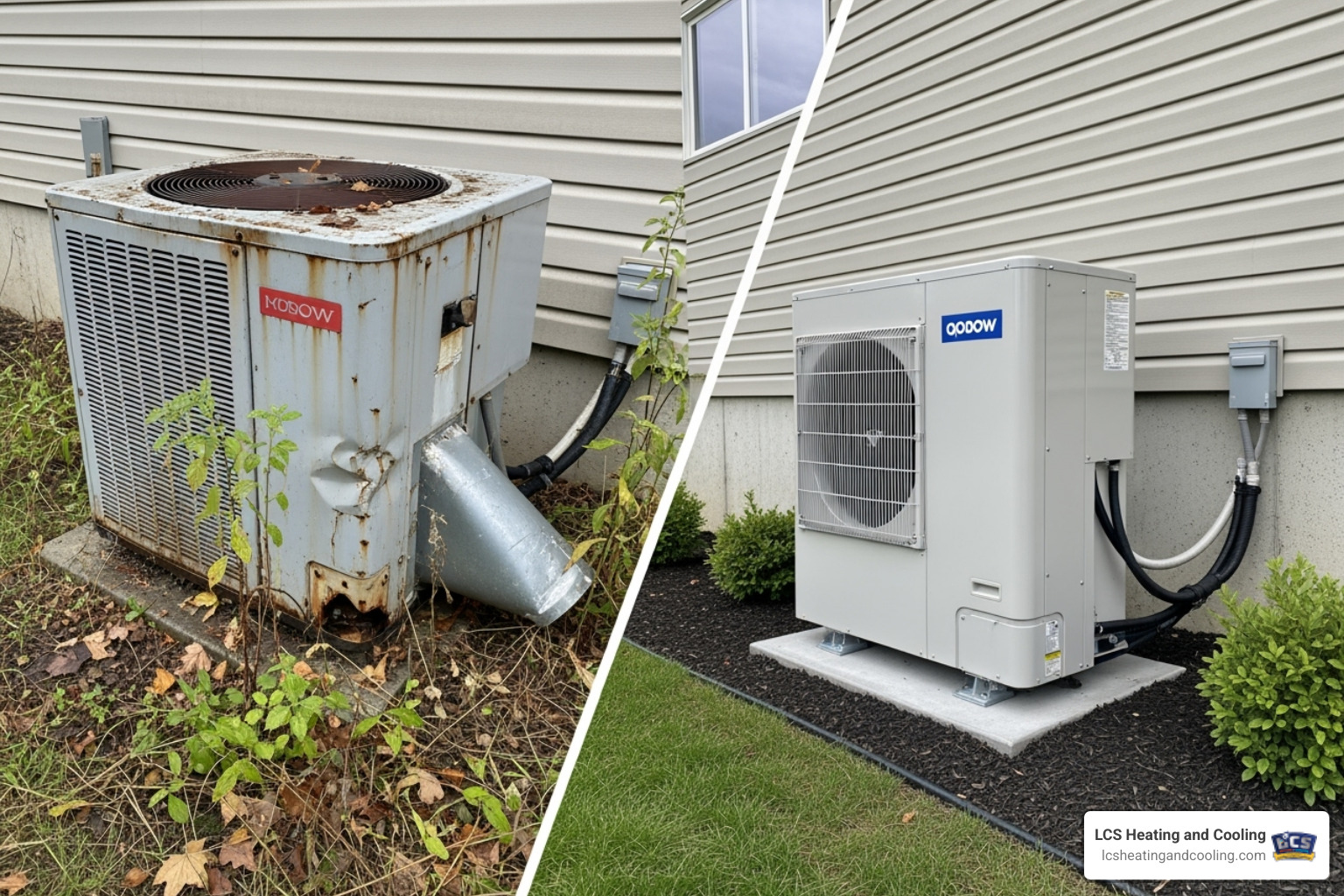
| Factor | Repair is Best | Replacement is Best |
|---|---|---|
| System Age | Under 10 years old | 10+ years old (reaching end of lifespan) |
| Repair Frequency | Infrequent, minor issues | Frequent breakdowns, constant service calls |
| System Performance | Efficient, maintains comfort | Inefficient, high energy bills, inconsistent comfort |
System age is one of the most telling factors. Most heat pumps have a lifespan of 10 to 15 years. If your unit is under 10 years old, a heat pump repair is usually the most sensible choice, as it likely has several more years of reliable service left.
However, if your heat pump is over a decade old, it's entering its final years. Older units are less reliable, and you may find yourself needing service more often.
Frequency of breakdowns also matters. An occasional repair is normal, but if you're constantly calling for service, those visits add up. A helpful guideline is to consider the scope of the repair. For major component failures, investing in a new, more efficient system can provide better long-term value than undertaking a significant repair on an aging unit.
Energy efficiency is another crucial consideration. Today's heat pumps are far more efficient than models from a decade ago. If your current unit struggles to keep up or your energy bills are climbing, a new system could offer significant savings. Modern units with higher SEER and HSPF ratings use less electricity to deliver the same comfort. The ENERGY STAR website provides more information on efficiency standards.
Finally, think about long-term value. A new heat pump comes with a manufacturer's warranty, the latest technology, and peace of mind. You'll also benefit from improved features and quieter operation.
If you're leaning toward replacement, our team can guide you with our Heat Pump Installation Indianapolis In services. We're here to provide honest assessments to help you make the best choice for your home and comfort.
The Importance of Maintenance in Preventing Repairs
Think of your heat pump like your car: regular maintenance is key to keeping it running smoothly and avoiding unexpected breakdowns. Skipping annual tune-ups is a common reason homeowners end up needing frequent heat pump repair. A little preventative care goes a long way.

Regular maintenance leads to improved efficiency. A well-maintained heat pump operates at peak performance, using less energy. According to research from the NREL, a neglected system can use 10% to 25% more energy. That's a significant impact on your monthly utility bills.
Maintenance also contributes to an extended lifespan. Tune-ups reduce stress on components by keeping them clean, lubricated, and functioning as intended. Addressing minor issues before they escalate can add several years to your system's life, delaying the need for a full replacement.
The real power of maintenance is preventative care. During a tune-up, our technicians inspect the entire system. We clean coils, check refrigerant levels, lubricate moving parts, and test electrical connections. This proactive approach allows us to catch small issues—like a worn part or weakening capacitor—before they turn into major emergency repairs or system breakdowns.
Finally, maintenance delivers improved comfort. A properly maintained heat pump provides reliable, consistent heating and cooling, eliminating frustrating temperature swings. It also ensures optimal airflow and cleaner indoor air for your family.
We recommend having your heat pump professionally serviced at least once a year. When you schedule regular maintenance, you're not just preventing repairs; you're ensuring reliable performance year-round. Learn more about our Heat Pump Maintenance Indianapolis In services.
Frequently Asked Questions about Heat Pump Issues
Why is my heat pump blowing cold air in heat mode?
Feeling cold air when you expect heat can be alarming, but it might be normal. Your heat pump periodically runs a defrost cycle to melt ice from the outdoor coil. During this brief cycle, you might feel cooler air. This is normal and should stop after a few minutes.
However, if the cold air persists, it signals a problem. Common causes include low refrigerant, which prevents the system from absorbing enough heat, a thermostat issue sending incorrect signals, or a problem with the reversing valve, which switches the system between heating and cooling. If the cold air continues, it's time to call for professional heat pump repair.
What is short cycling and how is it resolved?
Short cycling is when your system turns on and off rapidly without completing a full cycle. This pattern puts extreme stress on the compressor and can shorten the system's lifespan. The most common cause is a clogged air filter restricting airflow and causing the system to overheat and shut down. Other causes include an improperly sized system or a faulty thermostat.
You can start by changing a dirty air filter. If that doesn't solve the problem, you need a professional diagnosis. Our technicians can determine the root cause to prevent serious compressor damage and more significant issues down the road.
Can all heat pump problems be repaired?
The honest answer is: most can, but not all should be. Our qualified technicians can repair the vast majority of common heat pump issues, from electrical faults to refrigerant leaks. These repairs are often effective solutions.
However, in some situations, replacement is the better option. When an older unit (10+ years) suffers a major failure like a seized compressor, you face a big decision. The compressor is the heart of the system, and replacing it is a significant undertaking. In these cases, it often makes more sense to put that investment toward a brand-new, more efficient system that comes with a fresh warranty and modern features.
Our team will always give you an honest assessment and explain your options clearly. We'll help you understand the benefits of repair versus replacement so you can make the choice that's best for your home and budget.
Your Partner for Reliable Home Comfort
Your heat pump works hard every single day to keep your Indianapolis home comfortable, and when it falters, you deserve service that's just as reliable. By now, you know the warning signs—those unusual noises, the inconsistent temperatures, the climbing energy bills—and you understand when it's time to set down the DIY tools and pick up the phone.
The truth is, recognizing these signs early can save you from those middle-of-the-night emergencies when the heat stops working or the air conditioning gives up during the hottest week of summer. Regular maintenance is your best defense against unexpected breakdowns, keeping your system running efficiently and extending its lifespan. But when heat pump repair becomes necessary, you want a team that treats your home and your time with genuine respect.
That's where we come in. At LCS Heating and Cooling, we've built our reputation on something we call 7-Star Concierge Service. What does that mean for you? It means we show up when we say we will. It means we communicate clearly, explaining what's wrong in plain English (not confusing technical jargon). It means we respect your home as if it were our own. And most importantly, it means we're committed to finding lasting solutions, not just quick fixes that leave you calling us back in a few weeks.
We understand that inviting someone into your home requires trust. You're not just getting a repair technician—you're getting a partner who genuinely cares about your comfort and peace of mind. Whether your system needs a simple repair, comprehensive maintenance, or it's time to discuss replacement options, we'll walk you through every step with honesty and transparency.
Your home should be your sanctuary, a place where you feel comfortable no matter what the weather's doing outside. Don't let a struggling heat pump compromise that comfort for another day.
Ready to restore your home's comfort? Schedule your expert heat pump repair in Indianapolis today.
